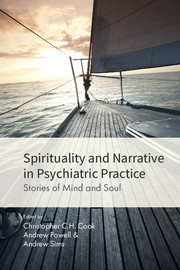Book contents
- Frontmatter
- Contents
- List of contributors
- Foreword
- Preface
- 1 Narrative in psychiatry, theology and spirituality
- 2 Spirituality and transcultural narratives
- 3 Psychopathology and the clinical story
- 4 Helping patients tell their story: narratives of body, mind and soul
- 5 Gods lost and found: spiritual coping in clinical practice
- 6 Stories of joy and sorrow: spirituality and affective disorder
- 7 Stories of fear: spirituality and anxiety disorders
- 8 Stories of transgression: narrative therapy with offenders
- 9 Narratives of transformation in psychosis
- 10 My story: a spiritual narrative
- 11 God's story revealed in the human story
- 12 Meaning without ‘believing’: attachment theory, mentalisation and the spiritual dimension of analytical psychotherapy
- 13 Stories of living with loss: spirituality and ageing
- 14 Beginnings and endings
- Index
14 - Beginnings and endings
Published online by Cambridge University Press: 02 January 2018
- Frontmatter
- Contents
- List of contributors
- Foreword
- Preface
- 1 Narrative in psychiatry, theology and spirituality
- 2 Spirituality and transcultural narratives
- 3 Psychopathology and the clinical story
- 4 Helping patients tell their story: narratives of body, mind and soul
- 5 Gods lost and found: spiritual coping in clinical practice
- 6 Stories of joy and sorrow: spirituality and affective disorder
- 7 Stories of fear: spirituality and anxiety disorders
- 8 Stories of transgression: narrative therapy with offenders
- 9 Narratives of transformation in psychosis
- 10 My story: a spiritual narrative
- 11 God's story revealed in the human story
- 12 Meaning without ‘believing’: attachment theory, mentalisation and the spiritual dimension of analytical psychotherapy
- 13 Stories of living with loss: spirituality and ageing
- 14 Beginnings and endings
- Index
Summary
In Chapter 1, ‘Narrative in psychiatry, theology and spirituality’, it was suggested that narratives have a beginning and an end. Stories continue, of course, yet at a given point the narrator will have to identify a place to start and a place to stop telling the story. The choice of the beginning and of the ending will significantly frame the narrative and thus influence its impact, meaning and scope. This has been evident throughout the book, with some authors offering narratives that go back to childhood, or narratives that end with a death, but with none that attempts to tell the story of a whole life from birth to death. This is partly due to limitations of space, but it is also because the narratives included have focused primarily on matters of spiritual interest. Of course, if these narrators were to tell the story again after a period of time, they might have more to say, as in the case of a patient who is asked by their doctor ‘How have things been since your last appointment?’ Each ending of each narration is thus, at least potentially, the beginning of another narrative still to be told.
Importantly, in the present context, every human life must have a beginning and an ending, reflected in its unique narrative, and usually beginning with an account of the family into which a new human life is born. An autobiography generally concludes in the present moment, since the author cannot write, although they may speculate, about what is yet to happen. A biography concludes with a death, and perhaps with a reflection of the enduring impact on the lives of others of a life lived well – or badly.
Each clinical encounter is a privileged opportunity given to the clinician to share in an autobiographical narrative. It usually begins (if told chronologically – which it may well not be) with a history of the family of origin and the personal life history. It must of necessity end in the present moment and it is in the nature of the clinical encounter that both patient and doctor are likely to be speculating about what might happen next.
- Type
- Chapter
- Information
- Spirituality and Narrative in Psychiatric Practice , pp. 173 - 184Publisher: Royal College of PsychiatristsPrint publication year: 2016



